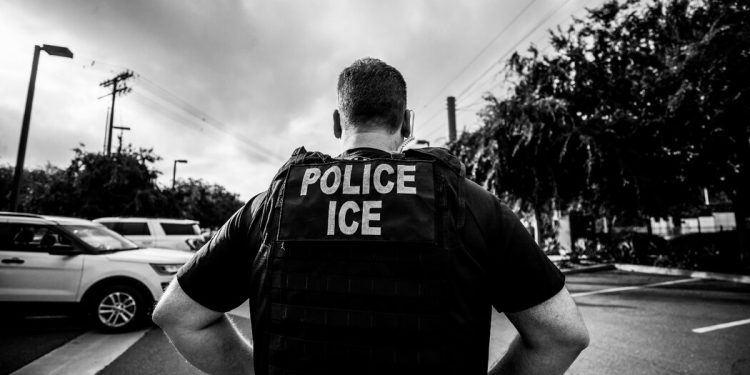Federal law enforcement under President Trump is engaged in dangerous political theater, with high-profile arrests of non-citizen students, workers and parents set up to score political points more than to protect national security.
It is not impossible for the United States to have a humane immigration system focused on public safety that provides for the growth of the nation and local communities. I’ve seen those possibilities through my work in military intelligence, counterterrorism, homeland defense and cyberoperations and as the chief of staff at U.S. Immigration Customs and Enforcement during the Biden administration.
Border security and interior immigration are linked but separate challenges. In towns within the United States, there is an effective way to do interior immigration enforcement and protect our national security without undue emphasis on undocumented immigrants who do not have criminal convictions.
Right now, the government is burning thousands of federal law enforcement hours on operations that privilege political objectives over public safety, attacking constitutional protections like due process and free speech as they do. If this administration doesn’t correct course, it will lock the country into a future of weaker enforcement, lowered trust in public safety officials and greater risk to Americans’ collective safety.
This is not the first administration to fail at this task. President Barack Obama leaned on broken enforcement policies, using deportation as a deterrent while unsuccessfully trying to reform the broader immigration enterprise. President Trump’s first administration implemented zero-tolerance policies that separated families, sought to end protections for children who arrived in this country as minors, prioritized draconian deterrence measures and relied on emergency public health restrictions, like Title 42. The Biden White House then continued to use emergency public health restrictions as a crutch to address a problem that needed a much more expansive solution.
As each successive administration relied more on executive power to manage the system, Congress did not pass structured, long-term immigration reform.
But this moment is worse. The new Trump White House is finding ever more cruel, even brutal, methods to publicly target some of the most vulnerable people in this country. While Americans are distracted by sensational videos of anti-migrant enforcement actions from the Trump administration on social media, the real threats grow.
The homeland security secretary, Kristi Noem, recently announced that federal agents arrested roughly 20,000 undocumented people across the country in February. That doesn’t mean 20,000 national security threats were removed from the United States. On average, the United States can deport only about 7,000 to 9,000 people monthly by plane, and detention centers were at maximum capacity. So what happened to the 13,000 other migrants who were arrested? The only rational law enforcement step would be to process and then release them. That means law enforcement’s time, energy and focus were wasted on a political stunt. And real people suffered.
Every ICE agent dispatched to detain a noncriminal farmworker, construction laborer or college student — many, if not most, of whom have legal standing to work and study in our communities — is an ICE agent not investigating fentanyl networks, cyberattacks, human trafficking or transnational gangs. Those are the actual bad actors who threaten American safety and sovereignty.
Last month, the Department of Homeland Security removed a Maryland father to El Salvador that it had no ground to deport, and despite well-documented threats against his life from local gangs. ICE arrested and continues to hold in detention a Tufts University student with no criminal record — another case that lacks any public safety rationale. These cases send a message that law enforcement is a prop, not a protector.
The machinery of federal law enforcement is powerful. That’s what makes it so dangerous when misused by political opportunists. ICE and U.S. Customs and Border Protection have greater authority than most Americans realize. They can detain people without a warrant, conduct searches without probable cause and deport people without criminal charges. These powers demand discipline, not spectacle. They exist to respond urgently to serious threats, prevent cross-border crime and detain individuals who pose risks when time or circumstances don’t allow for traditional criminal justice processes.
They do not exist to target migrant grandmothers from Guatemala, unaccompanied children fleeing gang violence, Haitian families seeking asylum from political collapse, Palestinian and Indian students who attended U.S. universities under lawful visas, or Mexican and Salvadoran families working and raising U.S. citizen children while trapped in immigration backlogs.
Over the past two decades, the United States has invested heavily in a sophisticated vetting infrastructure. It can flag threats based on identities, travel histories and behavioral patterns. It’s built to catch real bad actors before they can do harm. But instead of using its tools to protect children from abuse or disrupt transnational money laundering operations, they are being used to track down individuals with no criminal convictions, people who are providing our nation the benefits of their hope and hard work.
When ICE and C.B.P. are used in this manner, their mission is compromised. Career agents are sidelined. Morale drops. Recruitment suffers. When communities see federal law enforcement used to punish rather than to protect, they stop cooperating. Law enforcement loses tips, and witnesses. Local partners hesitate to share information. That’s how dangerous actors slip through.
The real bad actors are getting smarter and faster. Mexican cartels use tunnels and ultralight aircraft to move narcotics. Cybercriminals attack hospitals and rural infrastructure. International smuggling operations launder profits through cryptocurrency.
That means the best solution for public safety is not mass deportations — it’s giving undocumented immigrants who have been in the United States for a long time the opportunity to come forward, pay a fine and gain legal status.
This country needs law enforcement that goes after genuine threats, not just easy targets, and immigration enforcement that reflects who we are: a nation built by immigrants and secured by law.
Law enforcement agents know how to do it. They built the tools. But if the current administration keeps misusing them, the people who intend to harm us will succeed.
Jason P. Houser is a former ICE chief of staff, Department of Homeland Security counterterrorism official, Afghanistan combat veteran, and U.S. Cyber Command liaison to Israel and Europe.
The Times is committed to publishing a diversity of letters to the editor. We’d like to hear what you think about this or any of our articles. Here are some tips. And here’s our email: letters@nytimes.com.
Follow the New York Times Opinion section on Facebook, Instagram, TikTok, Bluesky, WhatsApp and Threads.
#Opinion #Immigration #Enforcement #Trump #Administration #Rogue





















